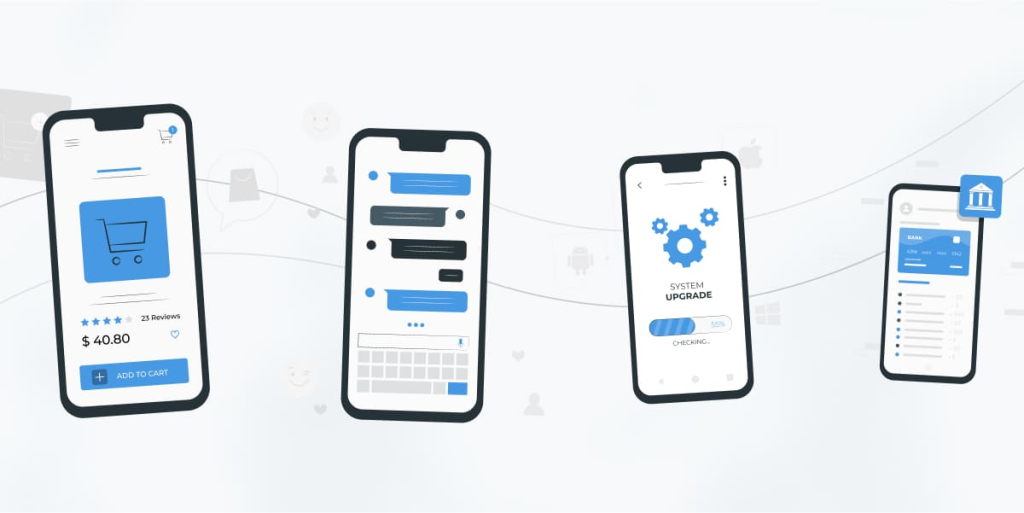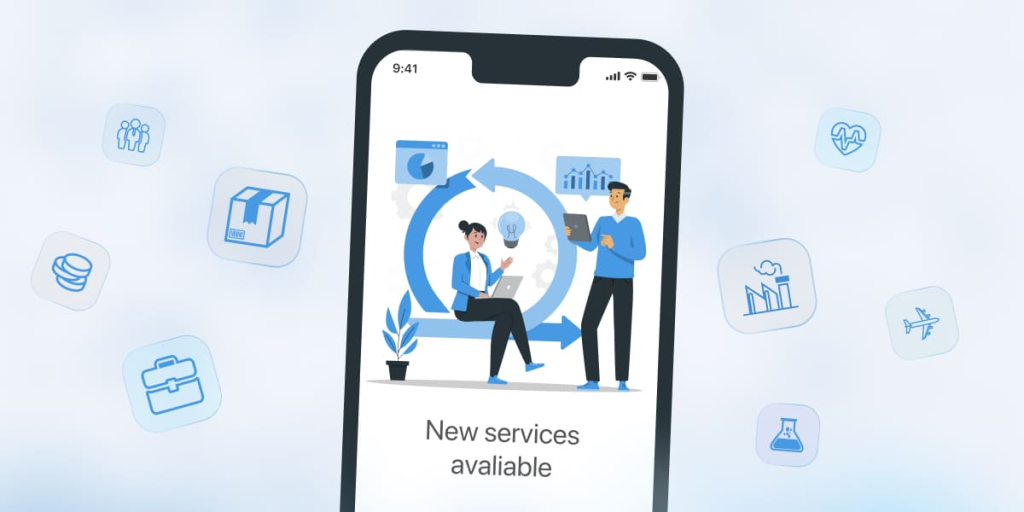In the era of digital business transformation, enterprise applications are becoming not just a fashionable trend, but a necessary tool for optimizing work processes, increasing efficiency and competitiveness of companies. Modern technological solutions allow you to automate routine tasks, simplify communication between employees and clients, and collect and analyze data to make informed business decisions. In this article, we will consider what enterprise applications are, what functions they can perform for various business sectors and how to implement such a solution in your company, when to expect the first results and what advantages the use of the modern eXpress platform for developing enterprise solutions provides.

An enterprise application is software designed specifically to meet the needs of an organization rather than individual users. Such applications are focused on solving the company's business problems, optimizing work processes, and increasing the efficiency of its operations.
Benefits of Enterprise Applications
Unlike personal applications, enterprise applications are aimed at improving business processes. Their key features are:
- scalability — the ability to adapt to the changing needs of the company, whether it is an increase in the number of users or expansion of functionality;
- security — a high level of data protection that meets business and legal requirements;
- integration — the ability to interact with other systems and services of the company;
- customizability — adaptation to the unique business processes of the organization;
- fault tolerance — the ability to work stably even when failures occur.
Enterprise applications are developed taking into account the specifics of a particular company and its industry, so they are often custom-made or significantly customized to meet business requirements.
Types of Enterprise Applications
Depending on the tasks to be solved, enterprise applications can be divided into several main categories:
- Enterprise resource planning systems (ERP):combine various business processes and provide a single point of access to company data. Such solutions include modules for managing finances, warehouses, production, personnel and other aspects of the organization's activities.
- Customer relationship management systems (CRM): help companies effectively interact with customers, manage sales, marketing and service. They allow you to collect and analyze customer data, track the history of interactions and improve the quality of service.
- Supply chain management systems (SCM): optimize the processes of purchasing, production and delivery of goods. They help control the movement of materials and products, manage inventory and ensure timely deliveries.
- Electronic document management systems (ECM/EDM): automate work with documents, provide their storage, search and joint editing. This allows you to reduce the time for processing information and minimize paper document flow.
Corporate messengers: provide communication between employees, allow you to organize teamwork, hold online meetings and exchange information in real time.
With the growing popularity of remote work and the need to access corporate data from anywhere in the world, mobile corporate applications are becoming increasingly popular. They provide employees with access to the tools and information they need from their mobile devices, increasing flexibility and productivity.

Useful functions for different business sectors
Each industry has its own unique needs and requirements for enterprise applications. Let's consider the advantages for different business areas:
Retail
Inventory management — involves tracking the availability of goods, automatic generation of orders for replenishment. Various loyalty programs — managing discounts, bonuses and personal offers for customers. Sales analytics — detailed sales statistics, identifying trends and seasonal fluctuations. Integration with cash register systems — synchronizing sales data in real time. Mobile payments — the ability to pay for goods through the application.
Manufacturing
Production planning — optimization of equipment and personnel loading. Quality control — monitoring product compliance with quality standards. Maintenance management — planning preventive maintenance and prompt response to malfunctions. Supply chain tracking — monitoring the movement of raw materials and finished products. Automation of document flow — generation of production documentation.
Financial sector
Secure access to banking services — the ability to perform financial transactions with a high level of security. Analytical tools — analysis of financial indicators and forecasting. Compliance automation — ensuring compliance with regulatory requirements. Risk management — identifying and assessing potential risks. Personalized financial recommendations — a system of tips for clients based on their financial behavior.
Healthcare
Electronic medical records — convenient storage and access to patient medical history. Appointment scheduling — managing doctors' schedules and registering patients. Telemedicine — conducting remote consultations. Drug inventory management — monitoring the availability and expiration dates of medications. Analytics and statistics — collection and analysis of medical data for research and improvement of service quality.
Logistics and transport
Cargo tracking — monitoring of location and delivery status in real time. Route optimization — building optimal routes taking into account traffic and other factors. Fleet management — monitoring the technical condition and operation of vehicles. Electronic document management — generation and exchange of transport documents. Integration with customs systems — simplification of customs clearance of goods.

When to expect the results?
Implementing a corporate application is an investment that should pay off with increased business process efficiency and reduced costs. However, it is important to understand that the results do not appear instantly. The time it takes to see tangible results depends on several factors:
- application complexity — the more complex the solution being implemented, the longer it will take to fully integrate;
- organization readiness for change — how easily employees adapt to new tools and processes;
- quality of the preparatory stage — correct task setting and implementation planning reduce the time to results;
- organization scale — in large companies, the implementation process may take longer due to a larger number of users and business processes.
On average, the first results from implementing a corporate application can be expected 3-6 months after launch. This time is necessary for the adaptation of employees, setting up processes and accumulating sufficient data for analysis.
Full return on investment usually occurs within 1-3 years, depending on the scale of the project and its impact on the company's business processes.

How to implement a corporate application in your company
Implementing a corporate application is a complex process that requires a systematic approach. Here are the main stages of this process:
Needs Analysis and Goal Setting
At this stage, it is necessary to determine what tasks the application should solve, what processes require automation, and what problems need to be eliminated. It is important to involve both management and employees who will directly work with the system in this process.
Solution Selection and Planning
Based on the analysis, the optimal solution should be selected. This could be: a ready-made application with the necessary functionality, a customizable platform that can be adapted to the needs of the company, or the development of a unique solution from scratch.
Next, it is necessary to develop a detailed implementation plan, including: stages and deadlines for work, resource allocation, employee training, testing and debugging, and the transition to a new system.
Preparing the infrastructure, setting up, and testing
Check that your IT infrastructure meets the requirements of the selected solution. It may be necessary to update your hardware, software, or network infrastructure.
If you have chosen to develop a unique solution or customize an existing platform, this is the stage where you create and adapt the application to your company's needs.
Before full-scale implementation, you must thoroughly test the application, identify and eliminate possible errors and inconsistencies.
Staff training and product implementation
Train employees to work with the new application. For example, group training, individual consultations, creating instructions and reference materials. Launch the application on a limited scale - for example, in one department or branch. This will allow you to identify and eliminate problems that may not have been noticed at the testing stage. And after a successful pilot launch, you can proceed to implementing the application throughout the organization.

Benefits of an enterprise application on the eXpress platform
The eXpress platform offers a comprehensive solution for creating and implementing enterprise applications, which has a number of significant advantages:
- Flexibility and scalability. The platform allows you to create applications that easily adapt to changing business needs. You can start with a small set of functions and gradually expand the application's capabilities as your company grows.
- Integration with existing systems. The platform provides easy integration with a wide range of enterprise systems, including ERP, CRM, accounting software, warehouse management systems and other business applications.
- High level of security. eXpress offers a multi-level data protection system, including encryption, multi-factor authentication, access control and other security mechanisms that comply with international standards.
- Cross-platform. Applications developed on the platform run on various devices - from personal computers to mobile phones and tablets.
- Rapid development and deployment. By using ready-made components and templates, the development and deployment time of applications on the eXpress platform is significantly reduced compared to traditional development methods.
- Analytical capabilities. eXpress provides powerful tools for collecting and analyzing data.
In addition, eXpress platform users receive ongoing technical support, as well as regular updates that include new features and security improvements.
Conclusion
Enterprise mobility is already an important part of modern business today, providing process optimization, increased efficiency and competitive advantages.
By following the above recommendations and choosing a reliable platform, you can create an enterprise application that will become a valuable tool for solving business problems and ensuring sustainable growth of your company.





